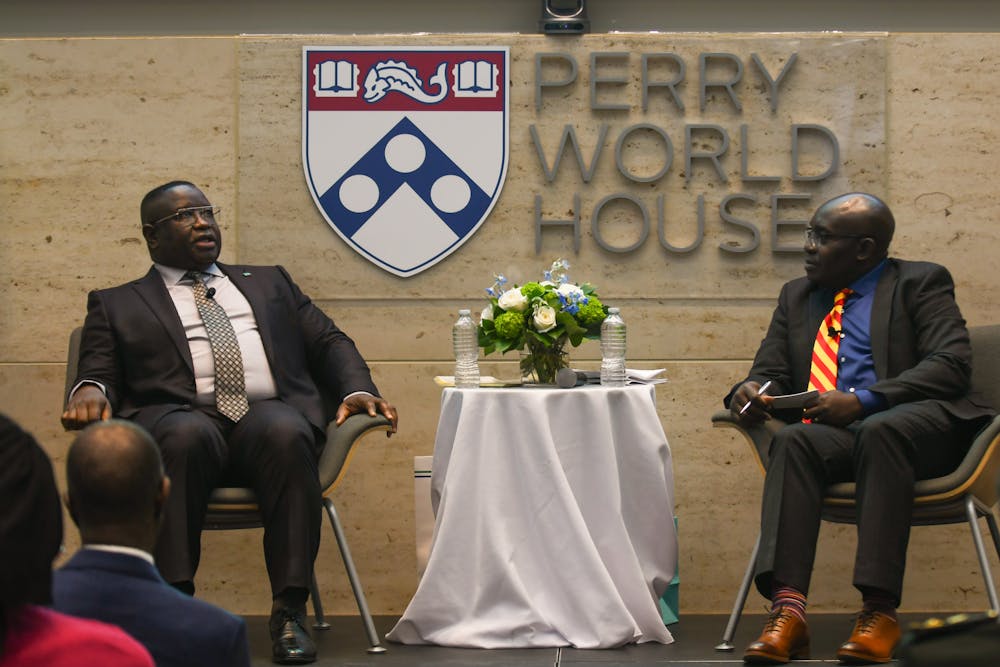
Julius Maada Bio (left), the President of Sierra Leone, spoke at the 3rd annual distinguished lecture in Africana Studies at Perry World House on March 25.
Credit: Caleb CrainPresident of Sierra Leone Julius Maada Bio delivered the Third Annual Distinguished Lecture in African Studies at Perry World House last Monday night, describing his policies to promote democratic peace and inclusive innovation.
The lecture’s theme this year was "Navigating the Future: Progressive Politics and Inclusive Development in Africa — The Sierra Leone Experience." In his presentation, Bio emphasized the importance of education, gender equality, and youth-oriented programs to further advance Sierra Leone and the continent of Africa.
Now in its third year, the Annual Lecture in African studies provides a conversational space for “important contemporary African figures in politics, art, and culture,” as described by Provost John L. Jackson Jr. in his introductory remarks at the event. In past years, lecture speakers have included Wole Soyinka, the first African to win the Nobel Prize for Literature, and President of Botswana Mokgweetsi E.K. Masisi.
Bio, a former military leader, has served as Sierra Leone's president since 2018 and is currently in his second term. He holds a master’s degrees in international affairs from American University. During Bio’s administration, Sierra Leone obtained a non-permanent seat on the United Nations Security Council and free schooling for youth in primary and secondary school.
In his lecture, Bio emphasized that these advancements are milestones for the country in the advancement of transparency, accountability, and equity.
“A true leadership legacy is not power accumulation but the empowerment it leaves behind,” he said.
He highlighted that these accomplishments occurred in the aftermath of crises such as the COVID-19 pandemic. Bio also described his work on other reforms such as free lunch, transportation, and core textbooks, as well as cancelling government-run university application fees to expand access to higher education.
“The youth are not mere recipients of progress,” he said. “They are the key architects of our democracies. They have dynamism, creativity, and perspectives that are essential for fostering innovation and advancement.”
He went on to explain his proposition for a youth employment scheme, which aims to create over 500,000 jobs for young people in Sierra Leone within the next five years, calling it a “strategic investment in our nation's human capital.”
Bio emphasized that women play an indispensable role in development and are key drivers of change. He credited much of his success to the women in his life, such as his mother and older sister. As a “product of women,” Bio said he feels strongly about the historic neglect of women. In 2023, he signed a bill guaranteeing that women would hold at least 30% of appointed, elected, and private sector positions in Sierra Leone.
For the second half of the evening, Bio sat down with moderator Wale Adebanwi, the director for the Center for Africana Studies, for an audience Q&A. Two attendees asked Bio to expand upon his country's action steps toward innovation.
One audience member mentioned a United States program for small businesses to gain subsidies and asked what Sierra Leone has put in place for young entrepreneurs. Bio answered that the government has been working on offering educational opportunities for entrepreneurs, adding that Sierra Leone received a $10 million grant from the African Development Bank Group to help businesses get off the ground.
Another audience member asked about what Bio has done to evolve digital infrastructure. He responded that legal frameworks are ongoing to enhance digital literacy and help power the freedom of speech, which will aid journalists and protestors.
Senior Staff Director for the Center for Africana Studies Kelly Harris told The Daily Pennsylvanian that he hoped that attending the event would be a particularly proud experience for African American and Sierra Leonean students.
2023 College graduate Lucas Monroe, who was involved in the Department of Africana Studies as an undergraduate, returned to the Penn to attend the event. As a former member of Penn men's basketball, he said that he felt that he spent most of his time in the athletic space and did not take full advantage of the opportunity to attend lectures.
“I mostly focused on the African American experience, so being able to hear from a world leader who can touch on a part of the world I have less experience in was important to me, especially as I’m navigating my future career goals and know that I want to be a part of conversations like that," he said.
Ashley Alexander, a College sophomore and student worker at the Center for Africana Studies, said that a dinner after the lecture allowed attendees to converse with Bio in a more intimate setting.
“As a student worker, witnessing the interactions between the President and attendees, including faculty members, community leaders, and fellow students, was both humbling and inspiring," Alexander said. "It underscored the importance of fostering cross-cultural dialogue and understanding, as well as the potential for collaboration in addressing shared challenges and advancing common goals."
Harris told the DP that Bio, in addition to delivering the lecture, visited Penn to look into possible partnerships with the University to support the welfare of his citizens.
Throughout the event, Bio emphasized that Sierra Leone is not in need of aid but an equitable partnership with the West, stating that Africa needs a “seat at the table.”
The Daily Pennsylvanian is an independent, student-run newspaper. Please consider making a donation to support the coverage that shapes the University. Your generosity ensures a future of strong journalism at Penn.
Donate



